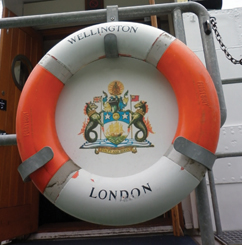A recent seminar on the Thames in London covered how seafarers and vessels are protected by Privately Contracted Armed Security Personnel (PCASP).
The event by the Security Association for the Maritime Industry (SAMI) under the heading “lessons learned” looked at the development by the International Organization for Standardization (ISO) of the ISO/PAS 28007:2012 standard for Private Maritime Security Companies (PMSCs), the reasons for the standard, how it is coming in and the lessons learned by the auditors and those being audited.
Read more including presentations at the SAMI website.
The venue was HQS Wellington, pictured, SAMI’s head office and home to the Honourable Company of Master Mariners. The gathering attracted a near capacity crowd in the Court Room, which was – appropriately – once the vessel’s engine room.
The audience, brought together maritime security companies and representatives from across the shipping industry, with insurers, shipping companies, lawyers and flag State officers represented. Chairing the event was SAMI CEO, the former Royal Marine Peter Cook. He began the afternoon by evaluating the perception of maritime security and gave a brief background to the development of standards.
He explained the sector, despite its importance in securing shipping and global trade, was still suffering from misconceptions despite a significant culture change.
It was stressed, while enormous strides have been made, there is still work to be done to unify maritime security providers, regulators and clients under one scheme – equally known, respected and applied by all. The aim of the “ISO/PAS 28007: Lessons Learned” seminar was to begin that dialogue. It was also a chance for the security contractors who have embraced the standard to explain their reasons why they have done so. Would ship owners choose to demand their providers have ISO/PAS 28007? Or would they be compelled to use it by lawyers and insurers, or will they simply ignore it and continue with an ad-hoc system of in-house vetting and word of mouth?
First to speak was Giles Noakes (Head of Security at shipping body BIMCO), with a presentation on the shipping industry’s demand for a regulatory structure for armed guards.
He pointed out that we have arrived where we are because of asymmetric warfare and a law enforcement vacuum, leading to business ‘buying’ its own security as the only alternative. On the high seas, unlike on land where states may feel their authority is challenged by ‘private armies’, no state takes responsibility. GUADRCON that BIMCO came up with as a standard contract for shippers to use when contracting for private security, was not meant to replace due diligence, but to offer controls on armed guards’ use of force and how the guards were controlled. As for piracy in the Indian Ocean, Noakes noted that the onshore conditions that create piracy haven’t really changed.









